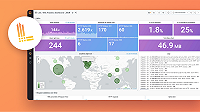Caution
Grafana Agent has reached End-of-Life (EOL) on November 1, 2025. Agent is no longer receiving vendor support and will no longer receive security or bug fixes. Current users of Agent Static mode, Agent Flow mode, and Agent Operator should proceed with migrating to Grafana Alloy. If you have already migrated to Alloy, no further action is required. Read more about why we recommend migrating to Grafana Alloy.
Important: This documentation is about an older version. It's relevant only to the release noted, many of the features and functions have been updated or replaced. Please view the current version.
prometheus.exporter.elasticsearch
The prometheus.exporter.elasticsearch component embeds
elasticsearch_exporter for
the collection of metrics from ElasticSearch servers.
Note
Currently, an Agent can only collect metrics from a single ElasticSearch server. However, the exporter can collect the metrics from all nodes through that server configured.
We strongly recommend that you configure a separate user for the Agent, and give it only the strictly mandatory security privileges necessary for monitoring your node, as per the official documentation.
Usage
prometheus.exporter.elasticsearch "LABEL" {
address = "ELASTICSEARCH_ADDRESS"
}Arguments
You can use the following arguments to configure the exporter’s behavior. Omitted fields take their default values.
Exported fields
The following fields are exported and can be referenced by other components.
For example, the targets can either be passed to a discovery.relabel
component to rewrite the targets’ label sets, or to a prometheus.scrape
component that collects the exposed metrics.
The exported targets will use the configured in-memory traffic address specified by the run command.
Component health
prometheus.exporter.elasticsearch is only reported as unhealthy if given
an invalid configuration. In those cases, exported fields retain their last
healthy values.
Debug information
prometheus.exporter.elasticsearch does not expose any component-specific
debug information.
Debug metrics
prometheus.exporter.elasticsearch does not expose any component-specific
debug metrics.
Example
This example uses a prometheus.scrape component to collect metrics
from prometheus.exporter.elasticsearch:
prometheus.exporter.elasticsearch "example" {
address = "http://localhost:9200"
}
// Configure a prometheus.scrape component to collect Elasticsearch metrics.
prometheus.scrape "demo" {
targets = prometheus.exporter.elasticsearch.example.targets
forward_to = [prometheus.remote_write.demo.receiver]
}
prometheus.remote_write "demo" {
endpoint {
url = PROMETHEUS_REMOTE_WRITE_URL
basic_auth {
username = USERNAME
password = PASSWORD
}
}
}Replace the following:
PROMETHEUS_REMOTE_WRITE_URL: The URL of the Prometheus remote_write-compatible server to send metrics to.USERNAME: The username to use for authentication to the remote_write API.PASSWORD: The password to use for authentication to the remote_write API.



